
 Gandalf |
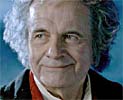 Bilbo |
 Frodo |
 Sam |
 Aragorn |
 Boromir |
 Legalos |
 Gimli |
 Merry |
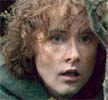 Pippin |
 Arwen |
 Elrond |
 Celeborn |
 Galadriel |
 Saruman |
 Gollum |

|
Download Antique illustrations put to a beautiful recitation of 'Night Before Christmas' |
|
|
|
"Escaped?" cried Aragorn. "That is ill news indeed. We shall all rue it bitterly, I fear. How came the folk of Thranduil to fail in their trust?" "Not through lack of watchfulness," said Legolas; "but perhaps through over-kindliness. And we fear that the prisoner had aid from others, and that more is known of our doings than we could wish. We guarded this creature day and night, at Gandalf's bidding, much though we wearied of the task. But Gandalf bade us hope still for his cure, and we had not the heart to keep him ever in dungeons under the earth, where he would fall back into his old black thoughts."
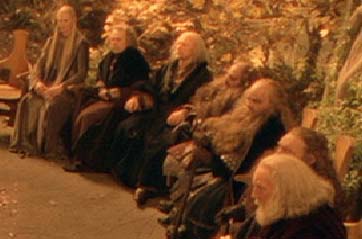 "You were less tender to me," said Gloin with a flash of his eyes, as old memories were stirred of his imprisonment in the deep places of the Elven-king's halls. "Now come!" said Gandalf. "Pray do not interrupt, my good Gloin. That was a regrettable misunderstanding, long set right. If all the grievances that stand between Elves and Dwarves are to be brought up here, we may as well abandon this Council." Gloin rose and bowed, and Legolas continued. "In the days of fair weather we led Gollum through the woods; and there was a high tree standing alone far from the others which he liked to climb. Often we let him mount to the highest branches, until he felt the free wind; but we set a guard at the tree's foot. One day he refused to come down, and the guards had no mind to climb after him: he had learned the trick of clinging to boughs with his feet as well as with his hands; so they sat by the tree far into the night. It was that very night of summer, yet moonless and starless, that Orcs came on us at unawares. We drove them off after some time; they were many and fierce, but they came from over the mountains, and were unused to the woods. When the battle was over, we found that Gollum was gone, and his guards were slain or taken. It then seemed plain to us that the attack had been made for his rescue, and that he knew of it beforehand. How that was contrived we cannot guess; but Gollum is cunning, and the spies of the Enemy are many. The dark things that were driven out in the year of the Dragon's fall have returned in greater numbers, and Mirkwood is again an evil place, save where our realm is maintained. "We have failed to recapture Gollum. We came on his trail among those of many Orcs, and it plunged deep into the Forest, going south. But ere long it escaped our skill, and we dared not continue the hunt; for we were drawing nigh to Dol Guldur, and that is still a very evil place; we do not go that way."
|
|
|
|
"I need no map," said Gimli, who had come up with Legolas, and was gazing out before him with a strange light in his deep eyes. "There is the land where our fathers worked of old, and we have wrought the image of those mountains into many works of metal and of stone, and into many songs and tales. They stand tall in our dreams: Baraz, Zirak, Shathur. "Only once before have I seen them from afar in waking life, but I know them and their names ... "Dark is the water of Kheled-zaram," said Gimli, "and cold are the springs of Kibil-nala. My heart trembles at the thought that I may see them soon."
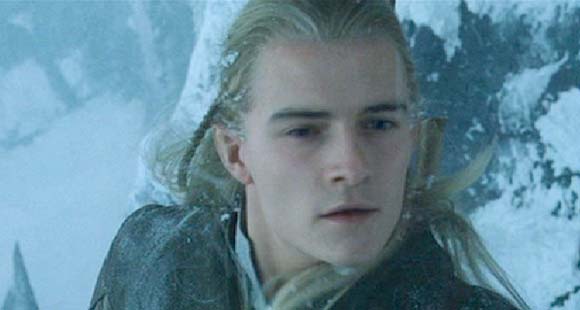 Aragorn was the tallest of the Company, but Boromir, little less in height, was broader and heavier in build. He led the way, and Aragorn followed him. Slowly they moved off, and were soon toiling heavily. In places the snow was breast-high, and often Boromir seemed to be swimming or burrowing with his great arms rather than walking. Legolas watched them for a while with a smile upon his lips, and then he turned to the others. "The strongest must seek a way, say you? But I say: let a ploughman plough, but choose an otter for swimming, and for running light over grass and leaf, or over snow -- an Elf." With that he sprang forth nimbly, and then Frodo noticed as if for the first time, though he had long known it, that the Elf had no boots, but wore only light shoes, as he always did, and his feet made little imprint in the snow. "Farewell!" he said to Gandalf. "I go to find the Sun!" Then swift as a runner over firm sand he shot away, and quickly overtaking the toiling men, with a wave of his hand he passed them, and sped into the distance, and vanished round the rocky turn.
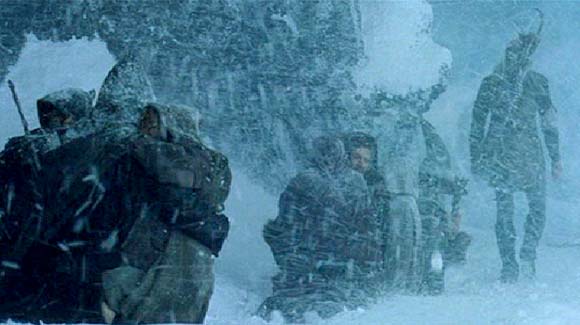
|
|
|
|
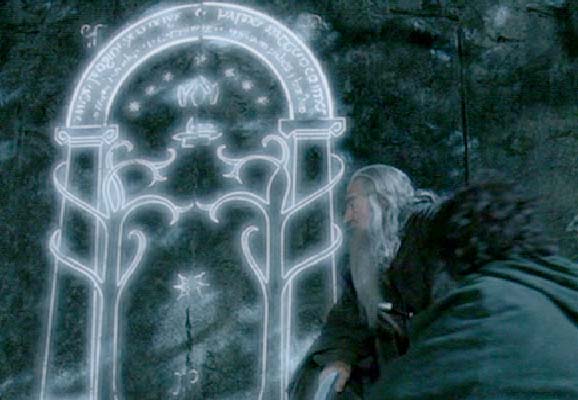 "Well, here we are at last!" said Gandalf. "Here the Elven-way from Hollin ended. Holly was the token of the people of that land, and they planted it here to mark the end of their domain; for the West-door was made chiefly for their use in their traffic with the Lords of Moria. Those were happier days, when there was still close friendship at times between folk of different race, even between Dwarves and Elves. "It was not the fault of the Dwarves that the friendship waned," said Gimli.
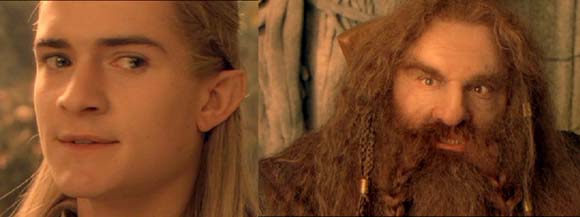 "I have not heard that it was the fault of the Elves," said Legolas. "I have heard both," said Gandalf; "and I will not give judgement now. But I beg you two, Legolas and Gimli, at least to be friends, and to help me. I need you both. ... Gimli aided Gandalf very little, except by his stout courage. At least he was not, as were most of the others, troubled by the mere darkness in itself. Often the wizard consulted him at points where the choice of way was doubtful; but it was always Gandalf who had the final word. The Mines of Moria were vast and intricate beyond the imagination of Gimli, Gloin's son, dwarf of the mountain-race though he was.
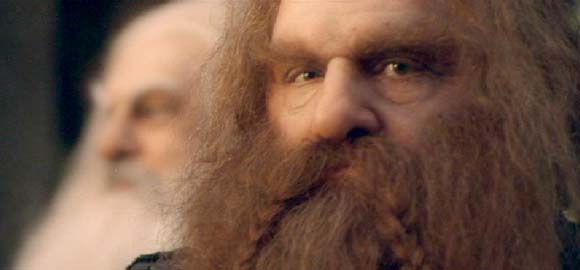
|
|
|
|
"That is Durin's Stone! cried Gimli. "I cannot pass without turning aside for a moment to look at the wonder of the dale!" "Be swift then!" said Aragorn, looking back towards the Gates. "The Sun sinks early. The Orcs will not, maybe, come out till after dusk, but we must be far away before nightfall. The Moon is almost spent, and it will be dark tonight." "Come with me, Frodo!" cried the dwarf, springing from the road. "I would not have you go without seeing Kheled-zaram." He ran down the long green slope. Frodo followed slowly, drawn by the still blue water in spite of hurt and weariness; Sam came up behind. Beside the standing stone Gimli halted and looked up. It was cracked and weather-worn, and the faint runes upon its side could not be read. "This pillar marks the spot where Durin first looked in the Mirrormere," said the dwarf. "Let us look ourselves once, ere we go!" They stooped over the dark water. At first they could see nothing. Then slowly they saw the forms of the encircling mountains mirrored in a profound blue, and the peaks were like plumes of white flame above them; beyond there was a space of sky. There like jewels sunk in the deep shone glinting stars, though sunlight was in the sky above. Of their own stooping forms no shadow could be seen. "O Kheled-zaram fair and wonderful!" said Gimli. "There lies the Crown of Durin till he wakes. Farewell!" He bowed, and turned away, and hastened back up the green-sward to the road again. ...
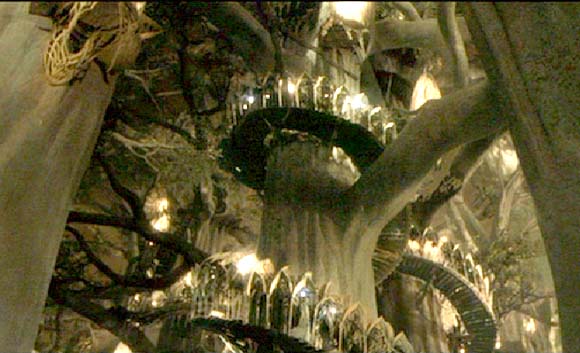 "There lies the woods of Lothlorien!" said Legolas. "That is the fairest of all the dwellings of my people. There are no trees like the trees of that land. For in the autumn their leaves fall not, but turn to gold. Not till the spring comes and the new green opens do they fall, and then the boughs are laden with yellow flowers; and the floor of the wood is golden, and golden is the roof, and its pillars are of silver, for the bark of the trees is smooth and grey. So still our songs in Mirkwood say. My heart would be glad if I were beneath the eaves of that wood, and it were springtime!" "As was agreed, I shall here blindfold the eyes of Gimli the Dwarf. The others may walk free for a while, until we come nearer to our dwellings, down in Egladil, in the Angle between the waters." This was not at all to the liking of Gimli. "The agreement was made without my consent," he said. "I will not walk blindfold, like a beggar or a prisoner. And I am no spy. My folk have never had dealings with any of the servants of the Enemy. Neither have we done harm to the Elves. I am no more likely to betray you than Legolas, or any other of my companions."
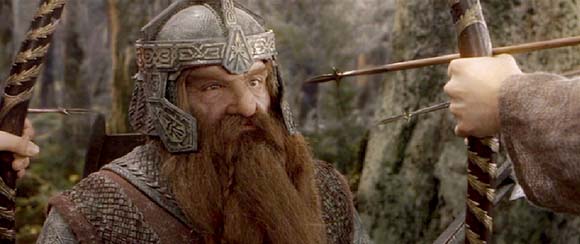 "I do not doubt you," said Haldir. "Yet this is our law. I am not the master of the law, and cannot set it aside. I have done much in letting you set foot over Celebrant." Gimli was obstinant. He planted his feet firmly apart, and laid his hand upon the haft of his axe. "I will go forward free," he said, "or I will go back and seek my own land, where I am known to be true of word, though I perish alone in the wilderness. "You cannot go back," said Haldir sternly. "Now you have come thus far, you must be brought before the Lord and the Lady. They shall judge you, to hold you or to give you leave, as they will. You cannot cross the rivers again, and behind you there are now secret sentinels that you cannot pass. You would be slain before you saw them." Gimli drew his ax from his felt. Haldir and his companions bent their bows. "A plague on Dwarves and their stiff necks!" said Legolas. "Come!" said Aragorn. "If I am still to lead this Company, you must do as I bid. It is hard upon the Dwarf to be thus singled out. We will all be blindfold, even Legolas. That will be best, though it will make the journey slow and dull." Gimli laughed suddenly. "A merry troop of fools we shall look! Will Haldir lead us all on a string, like many blind beggars with one dog? But I will be content, if only Legolas here shares my blindness." "I am an Elf and a kinsman here," said Legolas, becoming angry in his turn. "Now let us cry: "a plague on the stiff necks of Elves!" " said Aragorn. "But the Company shall all fare alike. Come, blind our eyes, Haldir!"
|
|
|
|
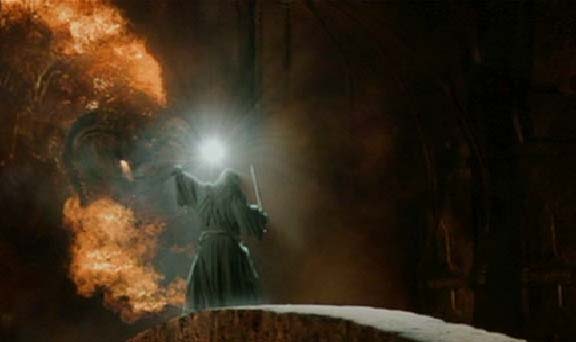 "Indeed I saw upon the bridge that which haunts our darkest dreams, I saw Durin's Bane," said Gimli in a low voice, and dread was in his eyes. "Alas!" said Celeborn. "We long have feared that under Caradhras a terror slept. But had I known that the Dwarves had stirred up this evil in Moria again, I would have forbidden you to pass the northern borders, you and all that went with you. And if it were possible, one would say that at the last Gandalf fell from wisdom into folly, going needlessly into the net of Moria." "He would be rash indeed that said that thing," said Galadriel gravely. "Needless were none of the deeds of Gandalf in life. Those that followed him knew not his mind and cannot report his full purpose. But however it may be with the guide, the followers are blameless. Do not repent of your welcome to the Dwarf. If our folk had been exiled long and far from Lothlorien, who of the Galadhrim, even Celeborn the Wise, would pass nigh and would not wish to look upon their ancient home, thought it had become an abode of dragons? 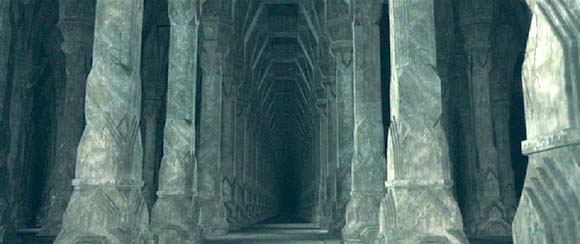 "Dark is the water of Kheled-zaram, and cold are the springs of Kibil-nala, and fair were the many-pillared halls of Khazad-dum in Elder Days before the fall of the mighty kings beneath the stone." She looked upon Gimli, who sat glowering and sad, and she smiled. And the Dwarf, hearing the names given in his own ancient tongue, looked up and met her eyes; and it seemed to him that he looked suddenly into the heart of an enemy and saw there love and understanding. Wonder came into his face, and then he smiled in answer. He rose clumsily and bowed in dwarf-fashion, saying: "Yet more fair is the living land of Lorien, and the Lady Galadriel is above all the jewels that lie beneath the earth!" 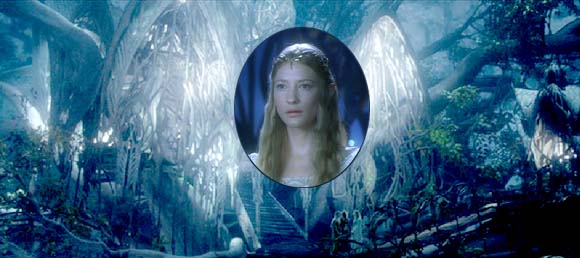
|
|
|
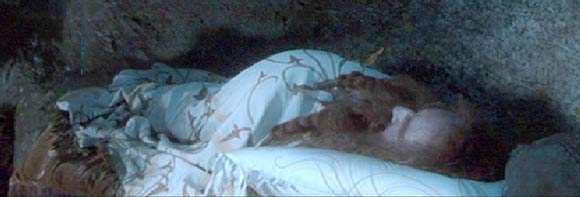 Legolas was away much among the Galadhrim, and after the first night he did not sleep with the other companions, though he returned to eat and talk with them. Often he took Gimli with him when he went abroad in the land, and the others wondered at this change. 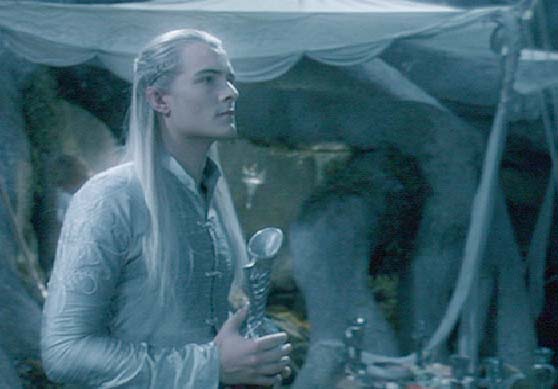
|
|
|
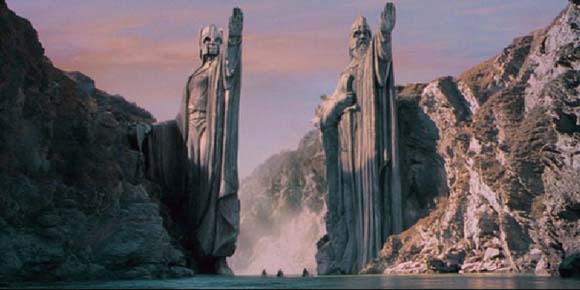 The Company was arranged in this way: Aragorn, Frodo, and Sam were in one boat; Boromir, Merry, and Pippin in another; and in the third were Legolas and Gimli, who had now become fast friends.
|
|
|
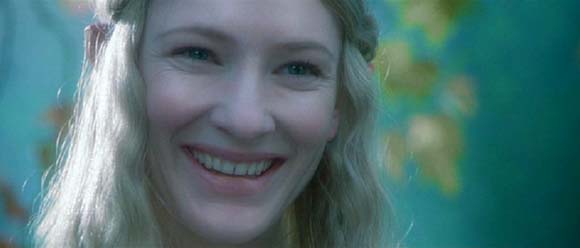 "And what gift would a Dwarf ask of the Elves?" said Galadriel, turning to Gimli. "None, Lady," answered Gimli. "It is enough for me to have seen the Lady of the Galadrim, and to have heard her gentle words." "Hear all ye Elves!" she cried to those about her. "Let none say again that Dwarves are grasping and ungracious! Yet surely, Gimli son of Gloin, you desire something that I could give? Name it, I bid you! You shall not be the only guest without a gift." "There is nothing, Lady Galadriel," said Gimli, bowing low and stammering. "Nothing, unless it might be -- unless it is permitted to ask, nay, to name a single strand of your hair, which surpasses the gold of the earth as the stars surpass the gems of the mine. I do not ask for such a gift. But you commanded me to name my desire." The Elves stirred and murmured with astonishment, and Celeborn gazed at the Dwarf in wonder, but the Lady smiled. "It is said that the skill of the Dwarves is in their hands rather than in their tongues," she said; "yet that is not true of Gimli. For none have ever made to me a request so bold and yet so courteous. And how shall I refuse, since I commanded him to speak? But tell me, what would you do with such a gift?" "Treasure it, Lady," he answered, "in memory of your words to me at our first meeting. And if ever I return to the smithies of my home, it shall be set in imperishable crystal to be an heirloom of my house, and a pledge of good will between the Mountain and the Wood until the end of days." Then the Lady unbraided one of her long tresses, and cut off three golden hairs, and laid them in Gimli's hand. "These words shall go with the gift," she said. "I do not foretell, for all foretelling is now vain: on the one hand lies darkness, and on the other only hope. But if hope shall not fail, then I say to you, Gimli son of Gloin, that your hands shall flow with gold, and yet over you gold shall have no dominion." 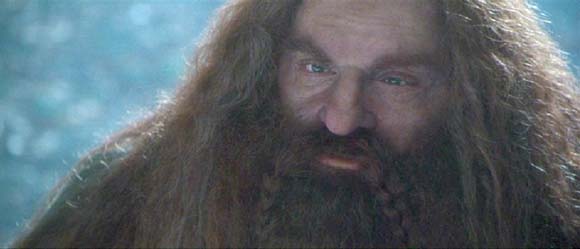
|
|
|
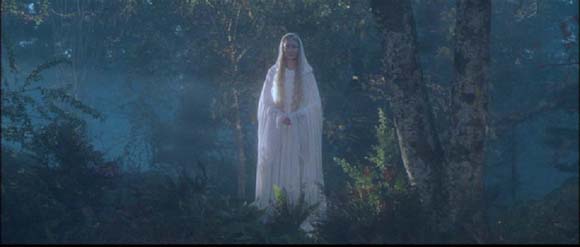 The travellers now turned their faces to the journey; the sun was before them, and their eyes were dazzled, for all were filled with tears. Gimli wept openly. "I have looked the last upon that which was fairest," he said to Legolas his companion. "Henceforward I will call nothing fair, unless it be her gift." He put his hand to his breast. "Tell me, Legolas, why did I come on this Quest? Little did I know where the chief peril lay! Truly Elrond spoke, saying that we could not foresee what we might meet upon our road. Torment in the dark was the danger that I feared, and it did not hold me back. But I would not have come, had I known the danger of light and joy. Now I have taken my worst wound in this parting, even if I were to go this night straight to the Dark Lord. Alas for Gimli son of Gloin!" "Nay!" said Legolas. "Alas for us all! And for all that walk the world in these after-days. For such is the way of it: to find and lose, as it seems to those whose boat is on the running stream. But I count you blessed, Gimli son of Gloin: for your loss you suffer of your own free will, and you might have chosen otherwise. But you have not forsaken your companions, and the least reward that you shall have is that the memory of Lothlorien shall remain ever clear and unstained in your heart, and shall neither fade nor grow stale."
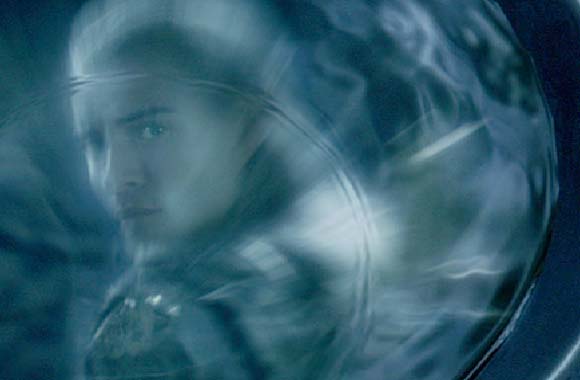 "Maybe," said Gimli; "and I thank you for your words. True words doubtless; yet all such comfort is cold. Memory is not what the heart desires. That is only a mirror, be it clear as Kheled-zaram. Or so says the heart of Gimli the Dwarf. Elves may see things otherwise. Indeed I have heard that for them memory is more like to the waking world than to a dream. Not so for Dwarves."
|
|
|
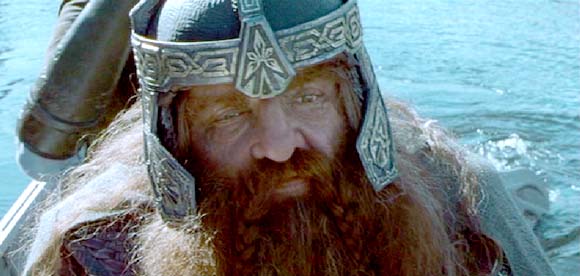 Each member of the Company was busy with his own thoughts. The heart of Legolas was running under the stars of a summer night in some northern glade amid the beech-woods; Gimli was fingering gold in his mind, and wondering if it were fit to be wrought into the housing for the Lady's gift.
|
|
|
|
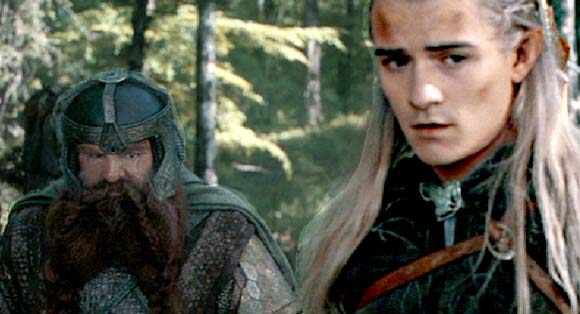 "Grievous is our loss," said Legolas. "Yet we must needs make up our minds without his [Gandalf's] aid. Why cannot we decide, and so help Frodo. Let us call him back and then vote! I should vote for Minas Tirith." "And so should I," said Gimli. "We, of course, were only sent to help the Bearer along the road, to go no farther than we wished; and none of us is under any oath or command to seek Mount Doom. Hard was my parting from Lothlorien. Yet I have come so far, and I say this: now we have reached the last choice, it is clear to me that I cannot leave Frodo. I would choose Minas Tirith, but if he does not, then I follow him." "And I too will go with him," said Legolas. "It would be faithless now to say farewell."
|
|
|
|
"No," said Aragorn. "One only of us is an Elf, Legolas from the Woodland Realm in distant Mirkwood. But we have passed through Lothlorien, and the gifts and favour of the Lady go with us."
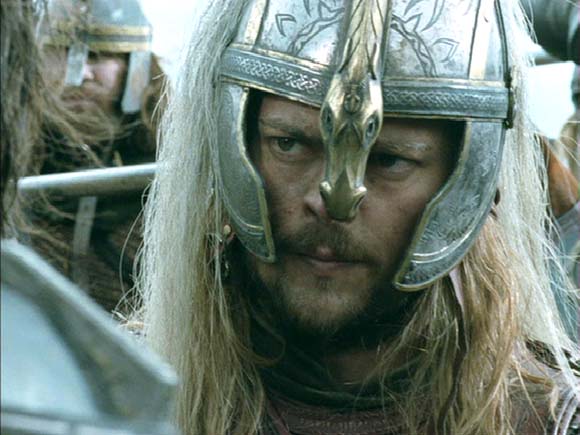 The Rider looked at them with renewed wonder, but his eyes hardened. "Then there is a Lady in the Golden Wood, as old tales tell!" he said. "Few escape her nets, they say. These are strange days! But if you have her favour, then you also are net-weavers and sorcerers, maybe." He turned a cold glance suddenly upon Legolas and Gimli. "Why do you not speak, silent ones?" he demanded. Gimli rose and planted his feet firmly apart: his hand gripped the handle of his axe, and his dark eyes flashed. "Give me your name, horse-master, and I will give you mine, and more besides," he said. "As for that," said the Rider, staring down at the Dwarf, "the stranger should declare himself first. Yet I am named Eomer son of Eomund, and am called the Third Marshal of Riddermark." "Then Eomer son of Eomund, Third Marshal of Riddermark, let Gimli the Dwarf Gloin's son warn you against foolish words. You speak evil of that which is fair beyond the reach of your thought, and only little wit can excuse you." Eomer's eyes blazed, and the Men of Rohan murmured angrily, and closed in, advancing their spears. "I would cut off your head, beard and all, Master Dwarf, if it stood but a little higher from the ground," said Eomer.
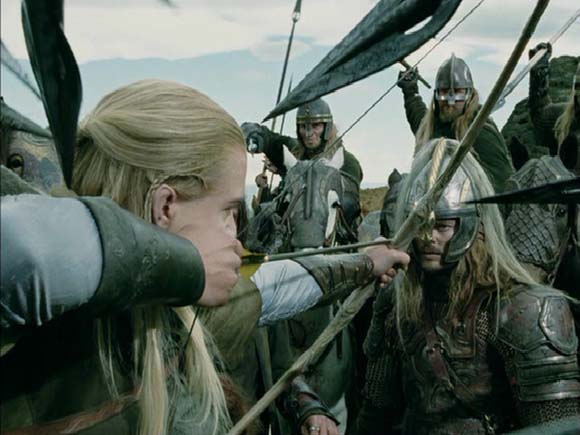 "He stands not alone," said Legolas, bending his bow and fitting an arrow with hands that moved quicker than sight. "You would die before your stroke fell." ...
"Farewell, and may you find what you seek!" cried Eomer. "Return with what speed you may, and let our swords hereafter shine together!" "I will come," said Aragorn. "And I will come, too," said Gimli. "The matter of the Lady Galadriel lies still between us. I have yet to teach you gentle speech." "We shall see," said Eomer. "So many strange things have chanced that to learn the praise of a fair lady under the loving strokes of a Dwarf's axe will seem no great wonder. Farewell!" ... With that he [Aragorn] fell asleep. Legolas already lay motionless, his fair hands folded upon his breast, his eyes unclosed, blending living night and deep dream, as is the way with Elves. Gimli sat hunched by the fire, running his thumb thoughtfully along the edge of his axe.
|
|
|
|
"I do not think the wood feels evil, whatever tales may say," said Legolas. He stood under the eaves of the forest, stooping forward, as if he were listening, and peering with wide eyes into the shadows. "No, it is not evil; or what evil is in it is far away. I catch only the faintest echoes of dark places where the hearts of the trees are black. There is no malice near us; but there is watchfulness and anger."
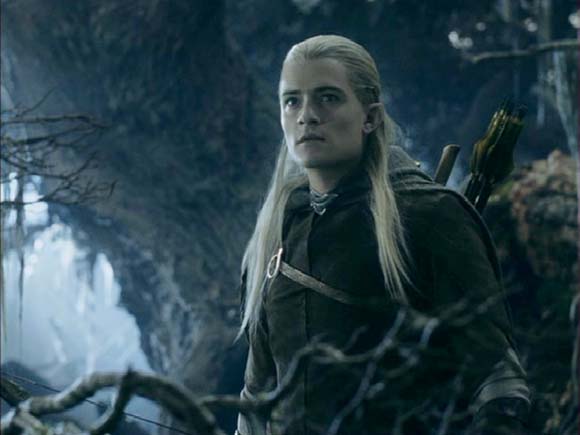 "Well, it has no cause to be angry with me," said Gimli. "I have done it no harm." "That is just as well," said Legolas. "But nonetheless it has suffered harm. There is something happening inside, or going to happen. Do you not feel the tenseness? It takes my breath." "I feel the air is stuffy," said the Dwarf. "This wood is lighter than Mirkwood, but it is musty and shabby."
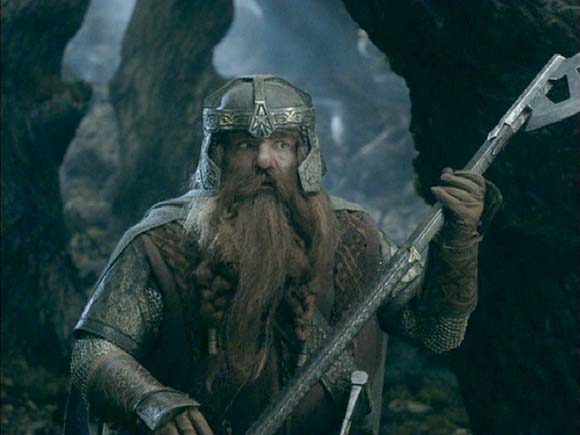 "It is old, very old," said the Elf. "So old that almost I feel young again, as I have not felt since I journeyed with you children. It is old and full of memory, I could have been happy here, if I had come in days of peace." "I dare say you could," snorted Gimli. "You are a Wood-elf, anyway, though Elves of any kind are strange folk. Yet you comfort me. Where you go, I will go. But keep your bow ready to hand, and I will keep my axe loose in my belt. Not for use on trees," he added hastily, looking up at the tree under which they stood. ...
To Legolas she [Galadriel] sent this word:
Legolas Greenleaf long under tree Gandalf fell silent and shut his eyes. "Then she sent me no message?" said Gimli and bent his head. "Dark are her words," said Legolas, "and little do they mean to those that receive them." "That is no comfort," said Gimli. What then?" said Legolas. "Would you have her speak openly to you of your death?" "Yes, if she had nought else to say." "What is that?" said Gandalf, opening his eyes. "Yes, I think I can guess what her words may mean. Your pardon, Gimli! I was pondering the messages once again. But indeed she sent words to you, and neither dark nor sad. "To Gimli son of Gloin," she said, "give his Lady's greeting. Lockbearer, wherever thou goest my thought goes with thee. But have a care to lay thine axe to the right tree!" "In happy hour you have returned to us, Gandalf," cried the Dwarf, capering as he sang loudly in the strange dwarf-tongue. "Come, come!" he shouted, swinging his axe. "Since Gandalf's head is now sacred, let us find one that it is right to cleave!"
|
|
|
|
"A safer seat than many, I guess," said Legolas. "Yet doubtless Gandalf will gladly put you down on your feet when blows begin; or Shadowfax himself. An axe is no weapon for a rider." And a Dwarf is no horseman. It is orc-necks I would hew, not shave the scalps of Men," said Gimli, patting the haft of his axe. At the gate they found a great host of men, old and young, all ready in the saddle. More than a thousand were there mustered. Their spears were like a springing wood. Loudly and joyously they shouted as Theoden came forth. Some held in readiness the king's horse, Snowmane, and others held the horses of Aragorn and Legolas. Gimli stood ill at ease, frowning, but Eomer came up to him, leading his horse. "Hail, Gimli Gloin's son!" he cried. "I have not had time to learn gentle speech under your rod, as you promised. But shall we not set aside our quarrel? At leasst I will speak no evil again of the Lady of the Wood." "I will forget my wrath for a while, Eomer son of Eomund," said Gimli; "but if ever you chance to see the Lady Galadriel with your eyes, then you shall acknowledge her the fairest of ladies, or our friendship will end." "So be it!" said Eomer. "But until that time pardon me, and in token of pardon ride with me, I beg. Gandalf will be at the head with the Lord of the Mark; but Firefoot, my horse, will bear us both, if you will." I thank you indeed," said Gimli greatly pleased. "I will gladly go with you, if Legolas, my comrade, may ride beside us."
|
|
|
|
"This is more to my liking," said the dwarf, stamping on the stones. "Ever my heart rises as we draw near the mountains. There is good rock here. This country has tough bones. I felt them in my feet as we came up from the dike. Give me a year and a hundred of my kin and I would make this a place that armies would break upon like water."
"I do not doubt it," said Legolas. "But you are a dwarf, and dwarves
are strange folk. I do not like this place, and I shall like it
no more by the light of day.
"It is dark for archery," said Gimli. "Indeed it is time for sleep. Sleep! I feel the need of it, as never I thought any dwarf could. Riding is tiring work. Yet my axe is restless in my hand. Give me a row of orc-necks and room to swing and all wearines will fall from me!" ... "Two!" said Gimli, patting his axe. He had returned to his place on the wall. "Two?" said Legolas. "I have done better, though now I must grope for spent arrows; all mine are gone. Yet I make my tale twenty at the least. But that is only a few leaves in a forest." ... Down from the wall leapt Gimli with a fierce cry that echoed in the cliffs. "Khazad! Khazad!" He soon had work enough. "Ai-oi!" he shouted. "The Orcs are behind the wall. Ai-oi! Come, Legolas! There are enough for us both. Khazad ai-menu!" ... He [Gimli] climbed up and found Legolas beside Aragorn and Eomer. The elf was whetting his long knife. There was for a while a lull in the assault, since the attempt to break in through the culvert had been foiled. "Twenty-one!" said Gimli. "Good!" said Legolas. "But my count is now two dozen. It has been knife-work up here." ... Aragorn gained the door, and swiftly it clanged to behind him. "Things go ill, my friends," he said, wiping the sweat from his brow with his arm. "Ill enough," said Legolas, "but not yet hopeless, while we have you with us. Where is Gimli?" "I do not know," said Aragorn. "I last saw him fighting on the ground behind the wall, but the enemy swept us apart." "Alas! That is evil news," said Legolas. "He is stout and strong," said Aragorn. "Let us hope that he will escape back to the caves. There he would be safe for a while. Safer than we. Such a refuge would be to the liking of a dwarf." "That must be my hope," said Legolas. "But I wish that he had come this way. I desired to tell Master Gimli that my tale is now thirty-nine." "If he wins back to the caves, he will pass your count again," laughed Aragorn. "Never did I see an axe so wielded."
|
|
|
|
"Forty-two, Master Legolas!" he cried. "Alas! My axe is notched: the forty-second had an iron collar on his neck. How is it with you?" "You have passed my score by one," answered Legolas. "But I do not grudge you the game, so glad am I to see you on your legs!" ... They rode in silence for a while; but Legolas was ever glancing from side to side, and would often have halted to listen to the sounds of the wood, if Gimli had allowed it. "These are the strangest trees that ever I saw," he said; "and I have seen many an oak grow from acorn to ruinous age. I wish that there was leisure now to walk among them: they have voices, and in time I might come to understand their thought." "No, no!" said Gimli. "Let us leave them! I guess their thoughts already: hatred of all that go on two legs; and their speech is of crushing and strangling." "Not of all that go on two legs," said Legolas. "There I think you are wrong. It is Orcs that they hate. For they do not belong here and know little of Elves and Men. Far away are the valleys where they sprang. From the deep dales of Fangorn, Gimli, that is whence they come, I guess." "Then that is the most perilous wood in Middle-earth," said Gimli. "I should be grateful for the part they have played, but I do not love them. You may think them wonderful, but I have seen a greater wonder in this land, more beautiful than any grove or glade that ever grew: my heart is full of it. "Strange are the ways of Men, Legolas! Here they have one of the marvels of the Northern World, and what do they say of it? Caves, they say! Caves! Holes to fly to in time of war, to store fodder in! My good Legolas, do you know that the caverns of Helm's Deep are vast and beautiful? There would be an endless pilgrimage of Dwarves, merely to gaze at them, if such things were known to be. Aye indeed, they would pay pure gold for a brief glance!" "And I would give gold to be excused," said Legolas; "and double to be let out, if I strayed in!" "You have not seen, so I forgive your jest," said Gimli. "But you speak like a fool. Do you think those halls are fair, where your King dwells under the hill in Mirkwood, and Dwarves helped in their making long ago? They are but hovels compared with the caverns I have seen here: immeasurable halls, filled with an everlasting music of water that tinkles into pools, as fair as Kheled-zaram in the starlight. "And, Legolas, when the torches are kindled and men walk on the sandy floors under the echoing domes, ah! then, Legolas, gems and crystals and veins of precious ore glint in the polished walls; and the light glows through folded marbles, shell-like, translucent as the living hands of Queen Galadriel. There are columns of white and saffron and dawn-rose, Legolas, fluted and twisted into dreamlike forms; they spring up from many-coloured floors to meet the glistening pendants of the roof: wings, ropes, curtains fine as frozen clouds; spears, banners, pinnacles of suspended palaces! Still lakes mirror them: a glimmering world looks up from dark pools covered with clear glass; cities, such as the mind of Durin could scarce have imagined in his sleep, stretch on through avenues and pillared courts, on into the dark recesses where no light can come. And plink! a silver drops falls, and the round wrinkles in the glass make all the towers bend an waver like weeds and corals in a grotto of the sea. Then evening comes: they fade and twinkle out; the torches pass on into another chamber and another dream. There is chamber after chamber, Legolas; hall opening out of hall, dome after dome, stair beyond stair; and still the winding paths lead on into the mountains' heart. Caves! The Caverns of Helm's Deep! Happy was the chance that drove me there! It makes me weep to leave them." "Then I will wish you this fortune for your comfort, Gimli," said the Elf, "that you may come safe from war and return to see them again. But do not tell all your kindred! There seems little left for them to do, from your account. Maybe the men of this land are wise to say little: one family of busy dwarves with hammer and chisel might mar more than they made." "No, you do not understand," said Gimli. "No dwarf could be unmoved by such loveliness. None of Durin's race would mine those caves for stones or ore, not if diamonds and gold could be got there. Do you cut down groves of blossoming trees in the springtime for firewood? We would tend these glades of flowering stone, not quarry them. With cautious skill, tap by tap -- a small chip of rock and no more, perhaps, in a whole anxious day -- so we would work, and as the years went by, we should open up new ways, and display far chambers that are still dark, glimpsed only as a void beyond fissures in the rock. And lights, Legolas! We should make lights, such lamps as once shone in Khazad-dum; and when we wished we would drive away the night that has lain there since the hills were made; and when we desired rest, we would let the night return." "You move me, Gimli," said Legolas. "I have never heard you speak like this before. Almost you make me regret that I have not seen these caves. Come! Let us make this bargain -- if we both return safe out of the perils that await us, we will journey for a while together. You shall visit Fangorn with me, and then I will come with you to see Helm's Deep." "That would not be the way of return that I should choose," said Gimli. "But I will endure Fangorn, if I have your promise to come back to the caves and share their wonder with me." "You have my promise," said Legolas. "But alas! Now we must leave behind both cave and wood for a while. See! We are coming to the end of the trees.
|
|
|
|
"And still is," said Legolas. "But not so great that we who dwell there ever tire of seeing new trees. I should dearly love to journey in Fangorn's Wood. I scarcely passed beyond the eaves of it, and I did not wish to turn back." Treebeard's eyes gleamed with pleasure. "I hope you may have your wish, ere the hills be much older," he said. "I will come, if I have the fortune," said Legolas. "I have made a bargain with my friend that, if all goes well, we will visit Fangorn together -- by your leave." "Any Elf that comes with you will be welcome," said Treebeard. "The friend I speak of is not an Elf," said Legolas; "I mean Gimli, Gloin's son here." Gimli bowed low, and the axe slipped from his belt and clattered on the ground. "Hoom, hm! Ah now," said Treebeard, looking dark-eyed at him. "A dwarf and an axe-bearer! Hoom! I have good will to Elves, but you ask much. This is a strange friendship!" "Strange it may seem," said Legolas; "but while Gimli lives I shall not come to Fanorn alone. His axe is not for trees, but for orc-necks, O Fangorn, Master of Fangorn's Wood. Forty-two he hewed in the battle." "Hoo! Come now!" said Treebeard. "That is a better story! Well, well, things will go as they will; and there is no need to hurry to meet them."
|
|
|
|
The company halted, and there was not a heart among them that did not quail, unless it were the heart of Legolas of the Elves, for whom the hosts of Men have no terror. ... But Arod, the horse of Rohan, refused the way, and he stood sweating and trembling in a fear that was grievous to see. Then Legolas laid his hands on his eyes and sang some words that went soft in the gloom, until he suffered himself to be led, and Legolas passed in. And there stood Gimli the Dwarf left all alone. His knees shook, and he was wroth with himself. "Here is a thing unheard of!" he said. "An Elf will go underground and a Dwarf dare not!" With that he plunged in. But it seemed to him that he dragged his feet like lead over the threshold; and at once a blindness came upon him, even upon Gimli Gloin's son who had walked unafraid in many deep places of the world. Aragorn had brought torches from Dunharrow, and now he went ahead bearing one aloft; and Elladan with another went at the rear, and Gimli, stumbling behind, strove to overtake him. He could see nothing but the dim flame of the torches, but if the company halted, there seemed an endless whisper of voices all about him, a murmur of words in no tongue that he had ever heard before. Nothing assailed the company nor withstood their passage, and yet steadily fear grew on the Dwarf as he went on; most of all because he knew now that there could be no turning back; all the paths behind were throned by an unseen host that followed in the dark. So time unreckoned passed, until Gimli saw a sight that he was afterwards loth to recall. The road was wide, as far as he could judge, but now the company came suddenly into a great empty space, and there were no longer any walls upon either side. The dread was so heavy on him that he could hardly walk. Away to the left glittered something in the gloom as Aragorn's torch drew near. Then Aragorn halted and went to look what it might be. "Does he feel no fear?" muttered the Dwarf. "In any other cave Gimli Gloin's son would have been the first to run to the gleam of gold. But not here! Let it lie!" ... The Company now mounted again, and Gimli returned to Legolas. They rode in file, and evening came on and a deep blue dusk; and still fear pursued them. Legolas turning to speak to Gimli looked back and the Dwarf saw before his face the glitter in the Elf's bright eyes. Behind them rode Ellahan, last of the Company, but not the last of those that took the downward road. "The Dead are following," said Legolas. "I see shapes of Men and of horses, and pale banners like shreds of cloud, and spears like winter-thickets on a misty night. The Dead are following."
|
|
|
|
There is some good stone-work here," he said as he looked at the walls; "but also some that is less good, and the streets could be better contrived. When Aragorn comes into his own, I shall offer him the service of stonewrights of the Mountain, and we will make this a town to be proud of." They need more gardens," said Legolas. "The houses are dead, and there is too little here that grows and is glad. If Aragorn comes into his own, the people of the Wood shall bring him birds that sing and trees that do not die. ... "That [Prince Imrahil] is a fair lord and a great captain of men," said Legolas. "If Gondor has such men still in these days of fading, great must have been its glory in the days of its rising." And doubtless the good stone-work is the older and was wrought in the first building," said Gimli. "It is ever so with the things that Men begin: there is a frost in Spring, or a blight in Summer, and they fail of their promise." Yet seldom do they fail of their seed," said Legolas. "And that will lie in the dust and rot to spring up again in times and places unlooked-for. The deeds of Men will outlast us, Gimli." "And yet come to naught in the end but might-have-beens, I guess," said the Dwarf. "To that the Elves know not the answer," said Legolas. With that the servant of the Prince came and led them to the Houses of Healing; and there they found their friends [Merry and Pippin] in the garden, and their meeting was a merry one. For a while they walked and talked, rejoicing for a brief space in peace and rest under the morning high up in the windy circles of the City. Then when Merry became weary, they went and sat upon the wall with the greensward of the Houses of Healing behind them; and away southward before them was the Anduin glittering in the sun, as it flowed away, out of the sight even of Legolas, into the wide flats and green haze of Lebennin and South Ithilien. And now Legolas feel silent, while the others talked, and he looked out against the sun, and as he gazed he saw white seabirds beating up the River. "Look!" he cried. "Gulls! They are flying far inland. A wonder they are to me and a trouble to my heart. Never in all my life had I met them, until we came to Pelargir, and there I heard them crying in the air as we rode to the battle of the ships. Then I stood still, forgetting war in Middle-earth; for their wailing voices spoke to me of the Sea. The Sea! Alas! I have not yet beheld it. But deep in the hearts of all my kindred lies the sea-longing, which it is perilous to stir. Alas! for the gulls. No peace shall I have again under beech or under elm." 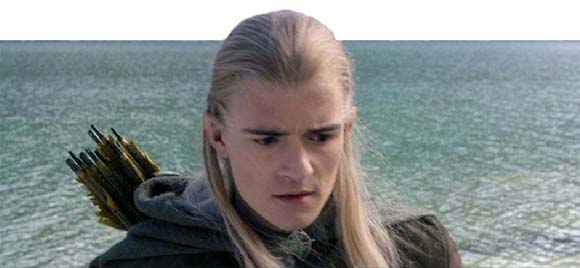 "Say not so!" said Gimli. "There are countless things still to see in Middle-earth, and great works to do. But if all the fair folk take to the Havens, it will be a duller world for those who are doomed to stay. ... Legolas paused and sighed, and turning his eyes southward softly he sang:
Silver flow the streams from Celos to Erui "Green are those fields in the songs of my people; but they were dark then, grey wastes in the blackness before us. And over the wide land, trampling unheeded the grass and the flowers, we hunted our foes through a day and a night, until we came at the bitter end to the Great River at last. "Then I thought in my heart that we drew near to the Sea; for wide was the water in the darkness, and sea-birds innumerable cried on its shores. Alas for the wailing of the gulls! Did not the Lady tell me to beware of them? And now I cannot forget them." ... Heavy would my heart have been, for all our victory at the havens, if Legolas had not laughed suddenly. "Up with your beard, Durin's son!" he said. "For thus is it spoken: Oft hope is born, when all is forlorn." But what hope he saw from afar after he would not tell. ... "Follow what may, great deeds are not lessened in worth," said Legolas. "Great deed was the riding of the Paths of the Dead, and great it shall remain, though none be left in Gondor to sing of it in the days that are to come." "And that may well befall," said Gimli. "For the faces of Aragorn and Gandalf are grave. Much I wonder what counsels they are taking in the tents there below. For my part, like Merry, I wish that with our victory the war was now over. Yet whatever is still to do, I hope to have a part in it, for the honour of the folk of the Lonely Mountain." "And I for the folk of the Great Wood," said Legolas, "and for the love of the Lord of the White Tree [Aragorn]."
|
|
|
|
"And I," said Legolas, "shall walk in the woods of this fair land, which is rest enough. In days to come, if my Elven-lord allows, some of our folk shall remove hither; and when we come it shall be blessed, for a while. For a while: a month, a life, a hundred years of Men. But Anduin is near, and Anduin leads down to the Sea. To the Sea!
To the Sea, to the Sea! The white gulls are crying, And so singing Legolas went away down the hill.
|
|
|
|
... "Come, Gimli!" said Legolas. "Now by Fangorn's leave I will visit the deep places of the Entwood and see such trees as are nowhere else to be found in Middle-earth. You shall come with me and keep your word; and thus we will journey on together to our own lands in Mirkwood and beyond." To this Gimli agreed, though with no great delight, it seemed.
|
|
|
|
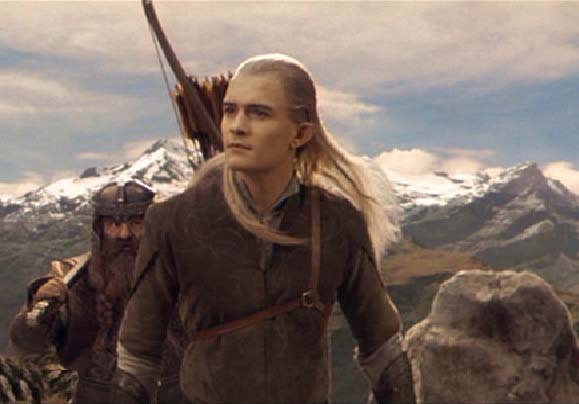 It is because of the fewness of women among them that the kind of the Dwarves increases slowly, and is in peril when they have no secure dwellings. For Dwarves take only one wife or husband each in their lives, and are jealous, as in all matters of their rights. The number of dwarf-men that marry is actually less than one-third. For not all the women take husbands: some desire none; some desire one that they cannot get, and so will have no other. As for the men, very many also do not desire marriage, being engrossed in their crafts. Gimli Gloin's son is renowned, for he was one of the Nine Walkers that set out with the Ring; and he remained in the company of King Elessar throughout the War. He was named Elf-friend because of the great love that grew between him and Legolas, son of King Thranduil, and because of his reverence for the Lady Galadriel. After the fall of Sauron, Gimli brought south a part of the Dwarf-folk of Erebor, and he became Lord of the Glittering Caves. He and his people did great works in Gondor and Rohan. For Minas Tirith they forged gates of mithril and steel to replace those broken by the Witch-king. Legolas his friend also brought south Elves out of Greenwood, and they dwelt in Ithilien, and it became once again the fairest country in all the westlands. Here follows one of the last notes in the Red Book We have heard tell that Legolas took Gimli Gloin's son with him because of their great friendship, greater than any that has been between Elf and Dwarf. If this is true, then it is strange indeed: that a Dwarf should be willing to leave Middle-earth for any love, or that the Eldar should receive him, or that the Lords of the West should permit it. But it is said that Gimli went also out of desire to see again the beauty of Galadriel; and it may be that she, being mighty among the Eldar, obtained this grace for him. More cannot be said of this matter. 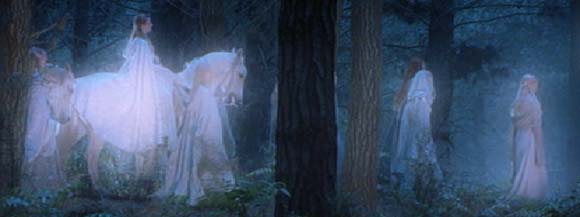
|
|
Characters |
|
 Poems and Songs |
Mirkwood |
|
|
|
The Hobbit ebook Fellowship of the Ring ebook Two Towers ebook Return of the King ebook Lord of the Rings Appendices ebook Tolkien Quiz You and Tolkien Quiz The White Council Message Board What Tolkien Officially Said About Elf Sex |
|
NJ Governor Lewis Morris |
 Breese Family |
 Lincoln Trial Judge Advocate Henry L. Burnett |
 President George W. Bush |
 Father Bradley Van Deusen |
 Mother Jean Van Deusen |


 Copyright © 2003, Mary S. Van Deusen
Copyright © 2003, Mary S. Van Deusen